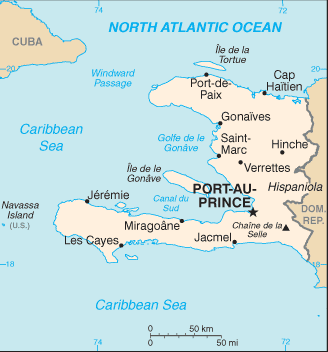Map:

Overview:
The native Arawak Amerindians - who inhabited the island of Hispaniola when it was discovered by Columbus in 1492 - were virtually annihilated by Spanish settlers within 25 years. In the early 17th century, the French established a presence on Hispaniola, and in 1697, Spain ceded to the French the western third of the island - Haiti. The French colony, based on forestry and sugar-related industries, became one of the wealthiest in the Caribbean, but only through the heavy importation of African slaves and considerable environmental degradation. In the late 18th century, Haiti's nearly half million slaves revolted under Toussaint L'OUVERTURE and after a prolonged struggle, became the first black republic to declare its independence in 1804. Haiti has been plagued by political violence for most of its history. It is the poorest country in the Western Hemisphere.
The People:
Population: 8,121,622
note: estimates for this country explicitly take into account the effects of excess mortality due to AIDS; this can result in lower life expectancy, higher infant mortality and death rates, lower population and growth rates, and changes in the distribution of population by age and sex than would otherwise be expected (July 2005 est.)
Age structure:
0-14 years: 42.6% (male 1,741,622/female 1,721,436)
15-64 years: 53.9% (male 2,137,225/female 2,242,639)
65 years and over: 3.4% (male 124,383/female 154,317) (2005 est.)
Religions:
Roman Catholic 80%, Protestant 16% (Baptist 10%, Pentecostal 4%, Adventist 1%, other 1%), none 1%, other 3% (1982)
note: roughly half of the population practices Voodoo
Government Type:
elected government
Leader(s) to pray for:
chief of state: Interim President Boniface ALEXANDRE (since 29 February 2004)
note: Jean-Bertrand ARISTIDE resigned as president on 29 February 2004; ALEXANDRE, as Chief of the Supreme Court, constitutionally succeeded Aristide
head of government: Interim Prime Minister Gerald LATORTUE (since 12 March 2004), chosen by extraconstitutional Council of Eminent Persons representing cross-section of political and civic interests
Source: The World Factbook
View All Countries